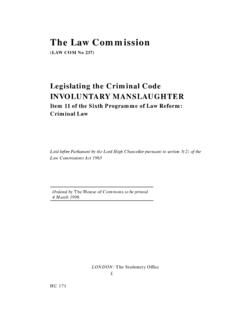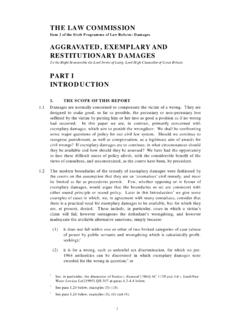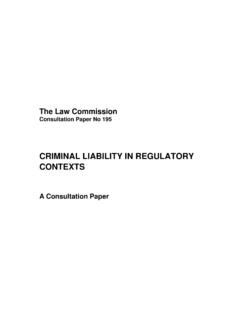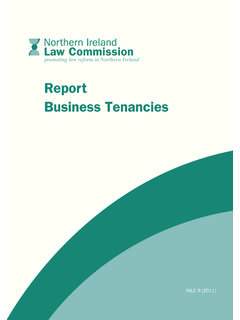Transcription of The Law Commission
1 the law Commission (LAW COM No 296)COMPANY SECURITY INTERESTSP resented to the Parliament of the United Kingdom by the Secretary of Statefor Constitutional Affairs and Lord Chancellor by Command of Her MajestyAugust 2005Cm 6654 Law Commission was set up by the law Commissions Act 1965 for the purpose ofpromoting the reform of the law Commissioners are:The Honourable Mr Justice Toulson, ChairmanProfessor Hugh Beale QC, FBAMr Stuart BridgeDr Jeremy HorderProfessor Martin Partington CBEThe Chief Executive of the law Commission is Mr Steve Law Commission is located at Conquest House, 37-38 John Street, TheobaldsRoad, London WC1N terms of this report were agreed on 7 July text of this report is available on the Internet at: LAW COMMISSIONCOMPANY SECURITY INTERESTSCONTENTSP aragraph PageSummaryxTerms and abbreviations used in this reportxvPART 1: of 2002 and 2004 consultation to the Consultative of that were not widely of our features of the scheme we of the , unincorporated businesses, and statement of the law of security over personal of this PagePART 2: THE BUSINESS scheme for company savings and current cost of of documents of particulars the development of electronic the time-limit for benefits and clauses with uncertain financial on the scheme for company further of 3: THE CORE SCHEME FOR COMPANY and and of security subject to the and that arise by operation of PageContractual property subject to the property and property for which there is a specialistmortgage over property outside England and excluded from the scheme.
2 Lloyd s trust that will not require to the proceeds of acquired subject to a situations in which no filing will be requirement to on-line for charge document and the certificate of sanction for failing to of the time-limit for registration and last-minute of the Last-minute filing filing or priority details of filing and financing name of the debtor and its registered name and address of the chargee or its description of the of the in the financing by the by the of unauthorised or accidental PageSearch between competing security of distinction between fixed and floating of floating in transferred as against unsecured for for as against and unregistered and registered fixed and registered floating of negotiable collateral and and assets for which there is a specialist aircraft and ships and intellectual registered in England and incorporated outside Great in created by Scottish companies over assets inEngland and charges that have been duly charges that are not currently of Companies Act Part PageRegistration of enforcement of to keep copies of instruments creating registers of charges be evidenced in writing signed by the debtor?
3 Require writing signed by the debtor? 4 SALES OF and priority of sales of proposals on to the CR definition of receivable assignments of against assignments of 5: FINANCIAL Cash forms of investment proposals on to the CR of our recommendations on security over of the provisions on financial Financial instruments PageIndirectly-held securities and other forms of Cash and Control of financial collateral and exemption from of control control versus negative control without negative Possession or control under the Financial requirements of the for purposes of perfection distinguished fromcontrol for other possession and control be defined at all? general test of listed methods of taking Writing and or negative? automatic charge in favour of an that have been obligation to disclose a control agreement of Super-priority of intermediaries and 6: LIST OF RECOMMENDATIONS146 The core requirement to of filing and of Companies Act 1985 Part PageShould charges be evidenced in writing signed by the debtor?
4 Of and priority of sales of against assignments of of the provisions on financial automatic charge in favour of an ADraft Company Security Regulations andExplanatory Notes158 APPENDIX BList of consultees214xSUMMARY 1. In 2002, the Department of Trade and Industry asked the law Commission toconsider the case for reforming the law on company charges. This followed arecommendation in the Final Report of the Company Law Review SteeringGroup. The Group reported that it had received substantial criticism of the currentsystem for registering charges and for deciding priority between them. Radicalreform was needed but it had not had time to consult on detailed proposals. 2. We published a consultation paper (CP No 164) in 2002, and a more detailedconsultative report (CP No 176) in 2004. These are available on our 3. Here we summarise our main proposals.
5 A fuller summary is available in Part 1 ofthe report, paragraphs Part 1 also provides cross-references to theparagraphs of the report where the issues are discussed in NEW SYSTEM OF ELECTRONIC NOTICE FILING 4. The current system of registering charges is unduly cumbersome, slow andexpensive. It involves the submission of paper documents, although the registeritself is electronic. It requires Companies House staff to check through lengthylegal documents and to issue a conclusive certificate of registration. 5. Under the new scheme we recommend: Electronic filing will replace the current paper-based system. To register a charge, it will be necessary only to send brief particulars of thecharge in a simple, electronic format. The original charge document will notbe sent. The Registrar of Companies will no longer be responsible for checking theparticulars that have been filed and will not issue a conclusive certificate.
6 Itwill be up to the party who files (normally the lender) to ensure that thefinancing statement identifies the correct company as debtor and that thedescription is adequate to cover the property subject to the charge. Providedthe financing statement does identify the correct company, the charge will bevalidly registered in respect of the property listed in the particulars. The property may be described in general terms, but there will be a facilityfor parties who wish the description to cover precisely what is in the chargeagreement to include the exact terms of the agreement. Formal responsibility for registration, and the rarely-applied criminal liabilityfor failure to register, will be removed from the company. It will be up to thelender taking the charge to file if it wishes to protect its security. If thecompany becomes insolvent before the charge is registered, the charge willnot be effective against the administrator or liquidator.
7 Unregistered chargeswill also be vulnerable to loss of THE 21 DAY TIME LIMIT 6. Under current law, unless a registrable charge is registered within 21 days, it isvoid against a liquidator or administrator. This causes inconvenience: each year,Companies House rejects around 3,000 late applications. Lenders must either re-execute the paperwork or apply to the court to register out of time. If a charge isregistered within the 21-day period, its priority depends on when it was created,not when it was registered. A charge-holder that registers first could find itselfsubject to a charge created up to three weeks earlier that it knew nothing about. 7. Under the new scheme: The formal time limit for registration (and the need for court applications forlate registration) will be removed. There will be no period of invisibility between submission of the particularsand their appearance on the register.
8 It will be possible to search quickly andreliably on-line. Lenders may file in advance of the transaction. They may therefore protecttheir position during negotiations. Similarly, a single filing may cover anumber of similar transactions between the same parties, removing the needfor multiple THE LIST OF REGISTRABLE CHARGES 8. The list of charges that need to be registered is out-of-date. The Companies Act1985 omits some charges which are often used. There is also uncertainty aboutwhat should be registered and what should not. 9. Under the new scheme: All charges are registrable unless specifically exempted. The principal exemptions will be for some charges over registered land andover financial collateral: see PRIORITY RULES 10. The Companies Act 1985 does not lay down clear rules about what happenswhen two or more creditors have registered charges over the same depends on complex common law rules that are not suited to modernfinancing methods.
9 Priority between a secured lender and someone who buysproperty that is subject to a charge is also unclear. 11. Under the new scheme: Priority between competing charges will be by date of filing (unlessotherwise agreed between the parties involved). This will simplify the currentlaw and will remove the current 21-day period of invisibility . The distinction between fixed and floating charges will be preserved,principally because of its importance in In the case of a floating charge, it will be unnecessary to rely on a negativepledge clause to prevent subsequent charges gaining priority. It will also beunnecessary to employ automatic crystallisation clauses , with theiruncertain effects, to protect property subject to a floating charge fromseizure by judgment creditors. The effect of registration on the rights of a person who buys the propertywithout knowing of the charge will be clarified.
10 If the charge is fixed but hasnot been registered, it will not affect a buyer who does not know of it; if thefixed charge has been registered it will be binding on the buyer. Some charges may also be registered in specialist registers, such as thosecovering unregistered land, registered aircraft and ships, and intellectualproperty. The regulations clarify that normally any priority rules set out in thespecialist legislation will 12. At present, a company charge cannot be registered in the Land Registry until ithas been registered with Companies House and a certficate of registration hasbeen issued. This causes administrative problems for the Land Registry. Theprocess is delaying the development of e-conveyancing. 13. Under the new scheme: If a charge over registered land is registered in the Land Registry, it will notneed to be registered in the Company Security Register as well. Instead, theLand Registry will automatically forward to Companies House its informationabout charges over land owned by companies.
















